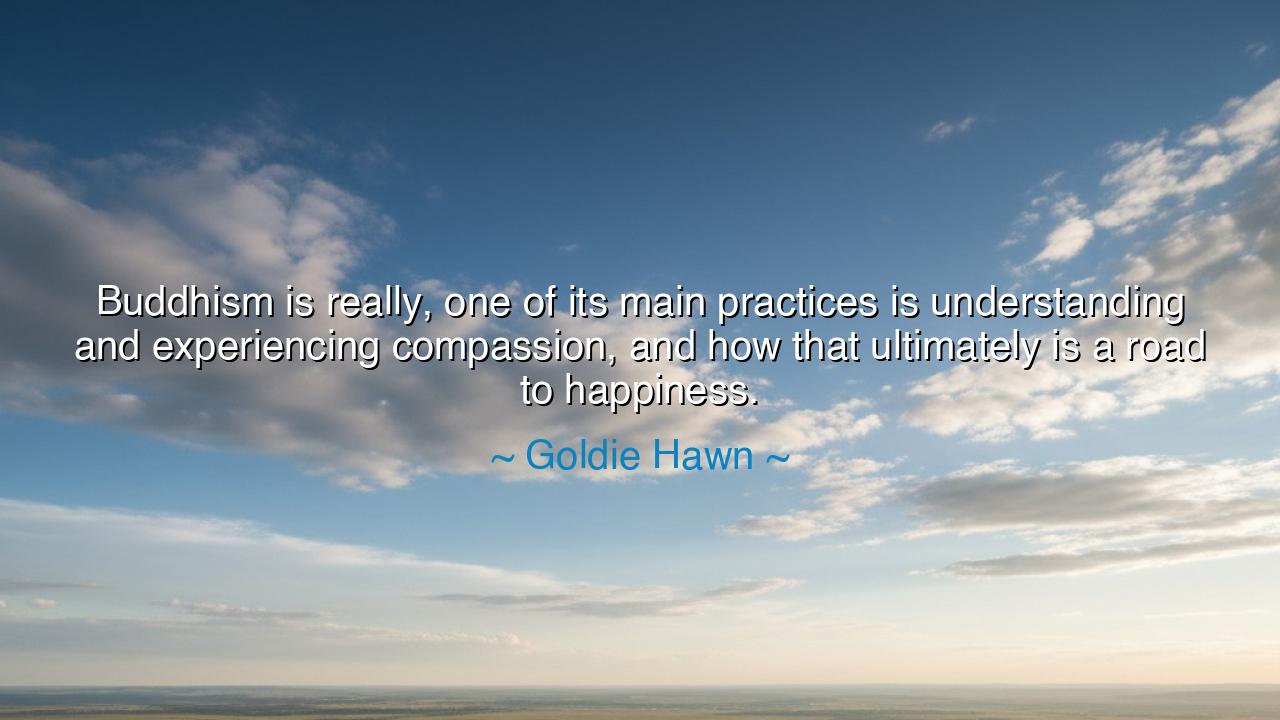
Buddhism is really, one of its main practices is understanding
Buddhism is really, one of its main practices is understanding and experiencing compassion, and how that ultimately is a road to happiness.






“Buddhism is really, one of its main practices is understanding and experiencing compassion, and how that ultimately is a road to happiness.” — Thus spoke Goldie Hawn, actress, thinker, and student of the spirit, capturing in a few gentle words a truth as ancient as the dawn: that compassion is not merely kindness, but the very pathway to happiness. Her voice echoes the timeless teaching of the Buddha, who, beneath the Bodhi tree, discovered that peace is not found in desire, nor in the conquest of others, but in the awakening of the heart toward all beings.
To the ancients of the East, compassion — or karuṇā — was not an emotion, but a state of being. It was the deep recognition that all creatures, from the mightiest to the smallest, share in suffering. To see this truth clearly is to understand that the boundaries separating one life from another are illusions. When a person opens their heart to the pain of the world, not to be crushed by it, but to heal it, they enter the very essence of Buddhism. For in understanding suffering, one transcends it; and in giving compassion, one receives joy.
The Buddha himself taught that every act of compassion purifies the soul, just as clear water washes away dust. When the disciple practices empathy — not in thought alone, but in deed — the chains of self-centeredness begin to break. Thus arises happiness, not from possessions or praise, but from the quiet radiance of a heart at peace. This truth, though gentle, is mighty; it transforms anger into patience, greed into generosity, and fear into love.
Consider the tale of Prince Siddhartha, before he became the Buddha. Born into luxury, he lived among silks and jewels, untouched by pain. Yet when he ventured beyond his palace and saw sickness, old age, and death, his heart broke open. It was in that moment — when he felt compassion for the world’s suffering — that his journey toward enlightenment began. His awakening did not spring from rejection of the world, but from his deep understanding of its fragility. Thus, his first step on the road to happiness was not escape, but empathy.
And through the ages, this same wisdom has been lived by many. There is the story of Thích Quảng Đức, the Vietnamese monk who, in 1963, set himself aflame in silent protest against injustice. His act was not born of rage, but of boundless compassion — a willingness to suffer so that others might awaken. The fire that consumed his body became a light that reached across the world. It was a terrible and beautiful reminder that true happiness is not comfort, but freedom — freedom from hatred, from illusion, from indifference.
Goldie Hawn’s words remind us that compassion is not reserved for saints and sages, but is a practice for all. It begins in small acts — listening without judgment, forgiving those who wound us, offering help where it is needed, or even simply wishing others well. Such acts may seem simple, yet they have the power to transform the heart. When we see others with eyes of understanding, our own suffering lessens. We become lighter, more peaceful, more alive. In lifting others, we rise ourselves.
The lesson of this teaching is both humble and profound: that happiness is not something we pursue, but something we create through compassionate living. To seek only our own joy is to chase a shadow; to wish joy for others is to bring light into the world. Begin each day with a heart open to understanding — ask not “What can I gain?” but “Whom can I help?” For in helping, you will find yourself helped; in giving, you will find yourself given to.
So, my child, remember this: the road to happiness is paved with compassion. Walk it with patience, and you will discover that every step softens the world beneath your feet. Let your kindness be steady as the river, your understanding vast as the sky. For the heart that feels for others does not grow weary — it grows wise. And in that wisdom lies the eternal peace that even kings cannot buy, nor time destroy — the peace of true happiness.






AAdministratorAdministrator
Welcome, honored guests. Please leave a comment, we will respond soon